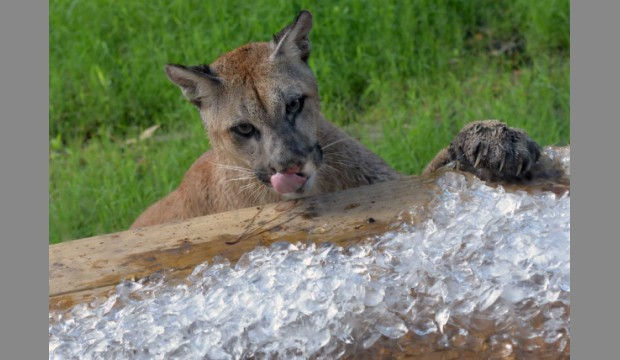It's the fur coats.
They don’t come off here, no matter how high the mercury. So for wolves, cougars and bobcats to stay cool when Savannah swelters, keepers at Oatland Island Wildlife Center have to get creative.
For Shanti the cougar that means frequent hosings. Not your typical scaredy cat when it comes to water, Shanti loves getting wet. As animal care technician Susan Inman picked up a hose Wednesday morning, the nearly 2-year-old cougar romped toward her, like a kid chasing the ice cream truck.
Inman sprayed the sleek cat’s face, back and tail. Shanti followed the stream of water, rearing up on her back legs and batting it with her thick paw.
“I wish my dogs were this good for a bath,” said Dr. Lesley Mailler, Oatland’s veterinarian. “Silly cat.”
Oatland’s other cougar, the 17-year-old “old man,” Comanche, is much more the stereotypical feline, testing the ground for moisture with a tentative paw each morning before venturing out of his nighttime enclosure. If a keeper spills his water bowl there, Comanche calls it a rain day and stays in.
For Oatland’s four wolves, summertime brings blood popsicles and broth popsicles, treats that alpha male Tundra, affectionately called Teddy, tries unsuccessfully to hoard. Keepers make these meaty frozen treats themselves, pouring broth, or blood that drips from the wolves’ regular meals, into plastic soda cups they freeze overnight.
Bobcats get smaller, broth-flavored ice cubes, lobbed with surprising accuracy into their water trough from the observation deck above their enclosure. Siblings Odie and Teal make the most of it, with Odie climbing into the tub for an impromptu bath.
“We found out they liked water because he did that,” Inman said.
Except for the wolves, Oatland’s animals are all native to Georgia, meaning they’re mostly adapted to the heat. And even the wolves are from a captive lineage that’s been here since Oatland’s founding four decades ago.
That’s not always the case at Zoo Atlanta, where the animals can come from much colder climates. The zoo’s world-famous giant pandas for instance, just can’t take the full-on Hotlanta summer.
They usually stay in their air-conditioned dayroom exhibits, said Rachel Davis, communications and social media manager. As at Oatland, a number of species get popsicle treats containing items from their usual diet.
Orangutans, for example, might have fruitsicles made with frozen water or juice with fruits frozen inside, as might the gorillas, Davis said. The otters occasionally get fishsicles, and the lions and tigers get popsicles made with meats or other frozen items from carnivorous diets.
Even though they’re inside, pandas sometimes get popsicles, too. Theirs are made of water with bamboo or fruit frozen inside. Orangutans have mister fans. Elephants have pools for wading, and warthogs get plenty of mud for wallowing.
All of these items do double duty, making the heat more bearable, but also engaging captive animals.
“In general, most of the animals love the frozen treats, and it keeps them busy as well, as it takes a little while to get to the goodies,” Davis said.
That’s definitely the case with Shanti, who doesn’t have to have daily hosings but whose keepers have found he likes it so much they can use the water play to train him to accept necessary medical treatments, such as vaccinations.
“It’s mainly enrichment for his enjoyment, but it serves a dual purpose,” Mailler said.
IF YOU GO
Oatland Island Wildlife Center, located off Islands Expressway, is open from 10 a.m. to 5 p.m. most days. Grounds must be cleared by 5 p.m. The center is closed on Thanksgiving, Dec. 24-25 and New Year’s Day.
In cases of inclement weather, Oatland may be closed or may close early. The cougar may not be on exhibit during strong or gusting winds. In the summer, keepers distribute ice, popsicles and in the case of the cougar, hosings, on an unpredictable schedule.
Admission is $5 for adults, $3 for children, military and students. Children 3 and under are admitted free.


Comments